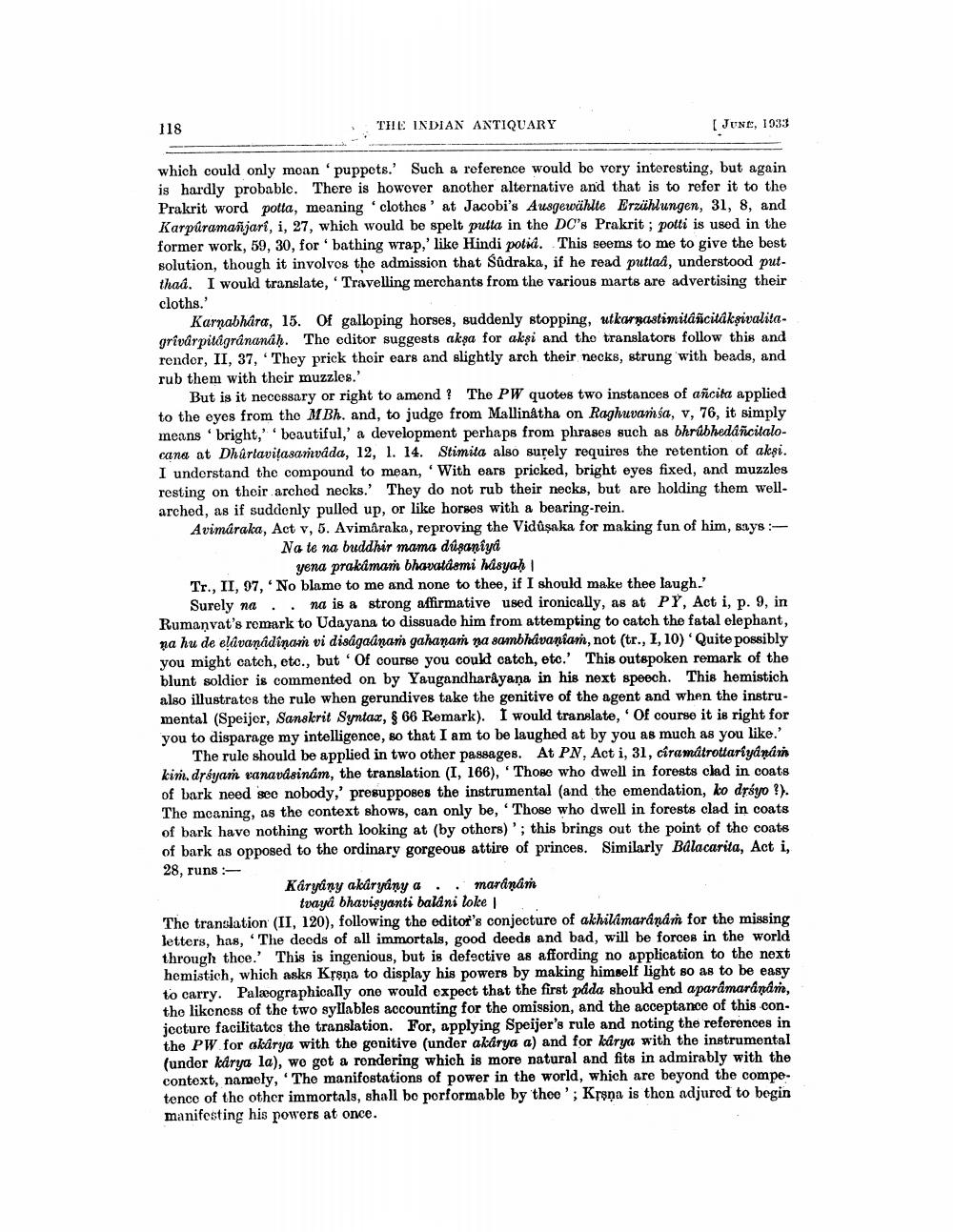________________
118
THE INDIAN ANTIQUARY
[JUNE, 1933
which could only mean 'puppets.' Such a reference would be very interesting, but again is hardly probable. There is however another alternative and that is to refer it to the Prakrit word potta, meaning clothes' at Jacobi's Ausgewählte Erzählungen, 31, 8, and Karpuramanjari, i, 27, which would be spelt putta in the DC's Prakrit; potti is used in the former work, 59, 30, for bathing wrap,' like Hindi potia. This seems to me to give the best solution, though it involves the admission that Sûdraka, if he read puttaa, understood putthad. I would translate, 'Travelling merchants from the various marts are advertising their cloths.'
Karnabhara, 15. Of galloping horses, suddenly stopping, utkargastimitâñcitákṣivalitagrivârpitâgrânanaḥ. The editor suggests aksa for aksi and the translators follow this and render, II, 37, They prick thoir ears and slightly arch their necks, strung with beads, and rub them with their muzzles.'
But is it necessary or right to amend? The PW quotes two instances of añcita applied to the eyes from the MBh. and, to judge from Mallinatha on Raghuvamsa, v, 76, it simply means bright, beautiful,' a development perhaps from phrases such as bhrúbhedâncitalocana at Dhûrlavițasamvada, 12, 1. 14. Stimita also surely requires the retention of aksi. I understand the compound to mean, With ears pricked, bright eyes fixed, and muzzles resting on their arched necks.' They do not rub their necks, but are holding them wellarched, as if suddenly pulled up, or like horses with a bearing-rein.
Avimaraka, Act v, 5. Avimâraka, reproving the Vidûşaka for making fun of him, says :Na te na buddhir mama dûşanîya
yena prakamam bhavatásmi hasyaḥ |
Tr., II, 97, No blame to me and none to thee, if I should make thee laugh.'
Surely na.. na is a strong affirmative used ironically, as at PY, Act i, p. 9, in Rumanvat's remark to Udayana to dissuade him from attempting to catch the fatal elephant, na hu de elavanâdînam vi disagaanam gahanam na sambhavaniam, not (tr., I, 10) 'Quite possibly you might catch, etc., but 'Of course you could catch, etc.' This outspoken remark of the blunt soldier is commented on by Yaugandharayana in his next speech. This hemistich also illustrates the rule when gerundives take the genitive of the agent and when the instrumental (Speijer, Sanskrit Syntax, § 66 Remark). I would translate, 'Of course it is right for you to disparage my intelligence, so that I am to be laughed at by you as much as you like.'
The rule should be applied in two other passages. At PN, Act i, 31, cîramâtrottariyânâm kim. dréyam vanavasinám, the translation (I, 166), Those who dwell in forests clad in coats of bark need see nobody,' presupposes the instrumental (and the emendation, ko drsyo?). The meaning, as the context shows, can only be, Those who dwell in forests clad in coats of bark have nothing worth looking at (by others); this brings out the point of the coats of bark as opposed to the ordinary gorgeous attire of princes. Similarly Balacarita, Act i, 28, runs :
Kárgány akáryanya.. marânâm tvaya bhavisyanti balani loke |
The translation (II, 120), following the editor's conjecture of akhilamaránâm for the missing letters, has, "The deeds of all immortals, good deeds and bad, will be forces in the world through thee. This is ingenious, but is defective as affording no application to the next hemistich, which asks Krsna to display his powers by making himself light so as to be easy to carry. Palæographically one would expect that the first påda should end aparâmarânâm, the likeness of the two syllables accounting for the omission, and the acceptance of this conjecture facilitates the translation. For, applying Speijer's rule and noting the references in the PW for akarya with the genitive (under akarya a) and for karya with the instrumental (under karya la), we get a rendering which is more natural and fits in admirably with the context, namely, 'The manifestations of power in the world, which are beyond the competence of the other immortals, shall be porformable by thee'; Krsna is then adjured to begin manifesting his powers at once.




